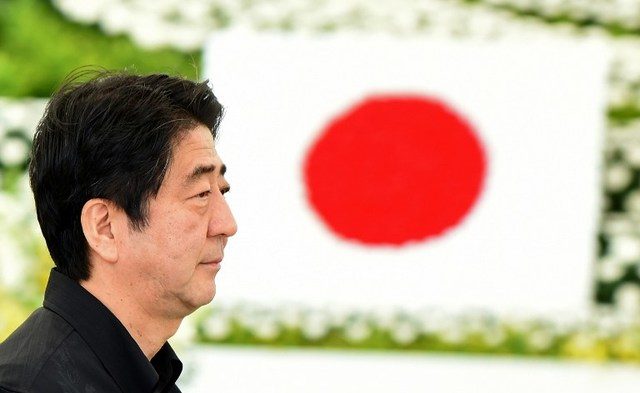SUMMARY
This is AI generated summarization, which may have errors. For context, always refer to the full article.

MANILA, Philippines – When Japanese Prime Minister Shinzo Abe gave a speech on August 14 to mark the 70th anniversary of the end of the Second World War, reception was divided. Some believed he had done enough, while others thought he fell short.
During the speech, Abe talked about how Japan “expressed the feelings of deep remorse and heartfelt apology” and upheld apologies by past ministers. He also said that future generations must not be “predestined” to apologize.
A poll published on August 19 showed that sentiments are divided over Abe’s speech, with 48% regarding it favorably, and 34% unfavorably. Hiroko Nagai, a professor at the Ateneo de Manila University, observed that even in opinions regarding the war, Japanese society is divided.
Apology
Within Japan, there are factions watching closely: ultranationalists who feel that an apology was a betrayal of the country, the bereaved families who think that Abe was turning his back on their fallen ancestors, and leftists who would have been disappointed if Abe did not apologize.
Unlike then Prime Minister Tomiichi Murayama’s apologetic 1995 statement and then chief Cabinet secretary Yohei Kono’s acceptance of blame for the comfort women, Abe took a more careful line.
“It’s difficult for a leader of a nation to actually admit the mistakes of their people,” said Karl Ian Cheng-Chua, program director of the Japanese Studies Program at the Ateneo.
Nagai personally thought Abe’s statement was “so-so” and that “he was trying to find a political neutral way and trying to avoid controversy.” It must be noted, however, that Kono and Murayama faced intense criticism from the conservatives.
But Ricardo Jose, director of the Third World Studies Center, found the frankness surprising – “I was expecting something much worse than that,” he said, adding, “To me this one was a frank admission that [Japan] made mistakes.”
Depoliticized youth
The Japanese youth, however, seems to care little about World War II (WWII) and their country’s role in it. This is part of the growing depoliticization of Japanese society, which is also reflected in their approach to history.
Many of the Japanese youth do not know the extent of their own war past, partly because of their education which tends to gloss over unpleasant parts of their history and the mindset that the past is secondary to the present.
Postwar Japan, like much of Asia, was heavily bombed and had to focus on rebuilding. It was only later in the 20th century that Japan experienced growth and other Asian countries were able to afford to reflect on WWII and ask for apologies.
Today’s recession is also forcing people to look to the present instead of reflecting on their past, according to Jose. “To them, history is not as important so much as finding jobs, raising a family,” he said.
But the downside to an apolitical youth is the lack of interest in questioning the social and political climate. In the case of the accusations of whitewashing, the changes are noticed less and critical understanding is lacking. Nagai has observed that aside from the older generation – many of whom have not related their full experiences – there are few sources about this available today.
Pop culture fills that gap. Cheng-Chua observed that many cartoons, movies, and manga depict a normalization of war. “It’s now this normalization of war – war is okay, war is cool – to a people who never experienced war. It might be problematic,” he explained. “We shouldn’t ban them, but they do create an influence that should be balanced out.”
Jose added that some museums and monuments in Japan, like the Yamato Museum, depict the beauty of war while glossing over the atrocities. For those dedicated to the victims of Allied attacks, they tell a story of Japanese victimization, which contributes to a slanted narrative.
Future
So does Japan have to keep apologizing?
“Personally, as long as there are people in Asia who still have pain from the war, then the government should continue to apologize,” said Nagai.
For Cheng-Chua, an apology can serve as a reminder to the Japanese people of their past and show the world that they have not forgotten. However, he sees that the Japanese have not yet come to terms with their history.
A better alternative is to have a balanced discussion about the war. “On Japan’s side, there have already been a lot of calls for them to get in touch with their past. On the other hand, this is a chance for reflection for us, Filipinos,” Cheng-Chua said.
After the Japanese apology, the Philippine government was quiet and there was no nationwide movement to rally behind the comfort women. “That reflects failure in our national history,” Cheng-Chua stressed.
“We should always remember what happened in the past, otherwise we repeat the errors. Although the past may be painful – it may bring up painful memories – it’s the past that serves as our foundation,” Jose added. Filipinos and Japanese need to face their past and reflect with an open mind. “I am of the point that we should look at [WWII], but we should look at it with an open mind – not with rancor, not with hatred,” he continued.
The scars of history will remain, but the future generations’ responsibility is not so much apologizing as it is reflecting on history and ensuring that such pain does not occur again. – Rappler.com
Bea Orante is a Rappler intern
Add a comment
How does this make you feel?
There are no comments yet. Add your comment to start the conversation.